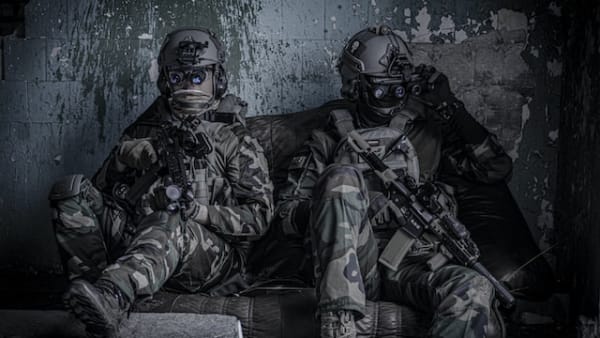Why should you join the military?
There are many reasons why individuals choose to start a career in the military. For some, these center on practical benefits such as job security, training in a specialist field, or pay and benefits. For others, reasons may be more patriotic.
This article outlines ten reasons why you should join the military and a few reasons why a career in the military may not be for you.
1. Serve your country
Many join the military due to their sense of patriotism or the desire to fulfill a duty and support their country.
All military roles, regardless of specialism or level, allow you to play a part in making a difference in your country's standing in the world.
Positions in the military mean that you can work with like-minded people, support your fellow compatriots and contribute to meaningful and rewarding work that impacts those you work with and your country.
2. Travel to different parts of the world
A significant benefit for military workers is the opportunity to travel. Military careers can see you working anywhere in the world. The military funds the travel costs for you and your family to your place of work and back to your permanent home.
In addition, when not working, you and your family are free to explore the country you are stationed in, taking advantage of the travel benefits offered.
The military has designated military resorts around the world, such as in Germany and Japan. Military personnel can also stay in military lodging for a reduced rate or fly on military scheduled flights subject to availability for free or at a vastly reduced fee.
In short, being in the military allows you and your family to travel and experience different countries and cultures in a way that many other careers do not.
3. Education benefits
Roles in the military enable individuals to develop a skill or area of expertise. This can also be beneficial if they decide to leave the military and continue their careers elsewhere.
Skills such as teamwork, communication, and time management are transferable skills needed in many non-military roles. When in the military, individuals can work in a variety of settings, some challenging. These experiences develop your resilience and adaptability, which are sought-after attributes in both military and non-military roles.
Careers in the military give individuals the educational, technical, and analytical skills that set them up for a career in the military and beyond.
4. Job security
For many, job security is a primary reason for embarking on any career. Those that join the military know that providing they perform well and abide by the military guidelines, a role in the military offers job security for the duration of their military contract.
As many contracts in the military are offered on a long-term basis, individuals can be sure to have a secure job role in their designated location for several years.
5. Good pay and benefits
A draw of a career in the military is often the pay and benefits offered. The salary and benefits vary according to the type of military career an individual chooses. Enlistment and re-enlistment bonuses are also awarded to individuals, and all military personnel benefit from free premium-level medical care for themselves and their immediate families. Housing payments are also given to some to cover the cost of housing expenses.
Those who join the military retire on a full final salary pension, with individuals eligible for retirement after 20 years of service. This can see you retire on up to 75% of your final salary.
Those joining the military straight after school who choose to retire, having served their 20 years, do so in their late 30s, an age that is far younger than many other professions. Although it is worth noting that many continue their military career past their initial 20 years of service.
6. Have an exciting career in a variety of fields
Careers in the military can see you travel, be stationed anywhere in the world, and deal with challenging situations daily. Jobs are offered in a variety of different disciplines from combat, engineering, logistics, medical, and intelligence to the more traditionally thought of office-based roles such as communications or human resources.
Specialisms mean that individuals carry out their work in a fast-moving and often challenging environment. You work in a setting or with information that contributes to the safety of your country, doing work that serves a broader public purpose.
7. A sense of purpose and camaraderie
Military careers offer those that join a clear sense of purpose. Everyone in the military works together to defend and protect their country, keeping people and the country's interests safe from threats.
Those that join the military work enjoy a sense of camaraderie and belonging. They work together to support one another to achieve the military's common purpose. The mutual sense of trust, loyalty, and togetherness that exists between those in the military is needed in helping each individual play their part in fulfilling their duty to their country and their fellow countrymen.
8. Leadership development
A career in the military helps individuals develop the attributes required for many leadership positions. Demonstrating the qualities required of an effective leader, such as resilience, a positive attitude, communication skills, and the drive to work toward a common goal, are skills needed by military leaders.
Developing these skills can see individuals progress through the ranks to attain a leadership role within the military.
Employers in the public and private sectors also look for these leadership qualities when selecting individuals for their leadership positions.
If these attributes and skills are represented correctly on a resume in relation to a new role, those in the military can transition from a military career to a leadership non-military role upon retirement.
9. Challenge yourself physically and mentally
Military careers are well known for being physically challenging, especially those in combat positions. When deciding whether a role in the military is for you, consider the physical and mental challenges you may face. Military careers offer the opportunity to develop your physical capabilities, work ethic, discipline when in a role, and strength of character.
Certain fields within the military provide ongoing mental challenges, whether through the environment or setting you are working in or the type of information you are dealing with.
10. Make a difference in the lives of others
Working in the military means that you directly impact the lives of others - your fellow citizens or those in other countries where your work takes you. The wider implications of the work that individuals do in the military give individuals clear motivations to continue, especially in challenging circumstances.
Making a difference in the lives of others plays a part in helping those in the military fulfill their duty to the military and also to their country.
Why shouldn't you join the military?
1. The risk of injury or death
Careers in the military are rewarding, offering a sense of purpose, achievement, and camaraderie. Depending on the setting and type of role, individuals work under the threat of severe injury or, in some instances, death.
Those that join fields such as combat must consider the implications of their career choice on themselves and their family, weighing up whether they and their family are willing and able to accept this risk to life or quality of life.
While this obvious threat exists due to the nature of some military roles, many military positions do not carry this level of risk. In the event of injury or death, the military provides disability benefits and compensation to you and your family.
2. Strict rules and regulations
A guiding principle of the military is discipline. All personnel within the military are expected to abide by the strict rules and guidelines that serve to keep those in the military and the information the military deals with safe.
Before joining the military, it is worth considering whether you are willing and able to abide by the rules of the military. Individuals who compromise these rules and regulations will be subject to disciplinary action.
Depending on the nature of the offense, consequences can include termination of a military contract and dishonorable discharge, prison time, or demotion to a lower rank. It is worth noting that for some, the existence of a strict military regime brings about personal benefits such as developing their strength of character, work ethic, and discipline.
3. The stress of combat
Individuals in combat face challenges that not many other careers present on a daily basis.
Dealing with combat situations, the environment, and the risks of injury or death to yourself or your teammates leads to mental and physical stress.
Before joining the military, a key consideration is whether you can deal with these situations as they happen and have the strength of character to overcome them as they happen or outside of the combat environment.
4. Frequent relocation
Military contracts vary from between two to eight years. For many, the frequent relocation for themselves and their families is seen as a positive experience.
A way to experience new countries and cultures and develop resilience and new friendships. For others, the frequent relocation that comes with a military career means that a career in the military does not suit them, their lifestyle, future life goals, or the well-being of their family.
When considering a role in the military, it is worth researching contract lengths, military bases that you may be relocated to during your military career, and the support networks that exist to aid with relocation.
5. PTSD
Post-traumatic stress disorder (PTSD) is an anxiety disorder that is quite common to occur in military personnel that have seen combat. Symptoms can include flashbacks, nightmares, anxiety, and depression.
Military PTSD can be especially difficult to deal with because it can be hard to get the support you need. Many people who suffer from PTSD feel isolated and alone. They may not want to talk about their experiences or may not even realize they have a problem.
If you think you or someone you know may have PTSD, it's important to get help. There are many resources available to military members and their families.






